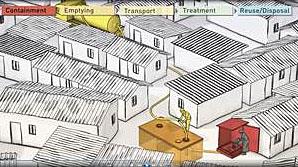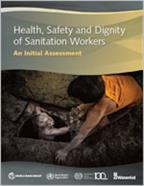Improving sanitation safety
Safe sanitation systems are fundamental to protect public health. WHO is leading efforts to monitor the global the burden of sanitation-related disease and access to safely managed sanitation and wastewater treatment and factors that enable or hinder progress under the Sustainable Development agenda.
WHO supports implementation through guidelines and tools on sanitation and health, safe use of wastewater and safe recreational water environments, using risk assessment to identify, prioritize, manage and monitor coordinated action to protect public health.
WHO also coordinates sanitation actions with partners in other health initiatives such as neglected tropical diseases, cholera, nutrition, infection prevention and control and antimicrobial resistance



